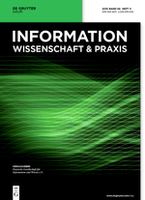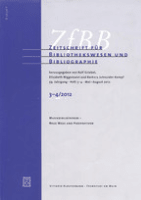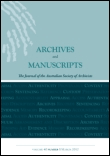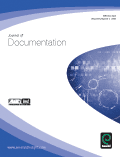
KNOWLEDGE ORGANIZATION
Scope & Guideline
Transforming Information Landscapes through Scholarship
Introduction
Aims and Scopes
- Knowledge Organization Systems (KOS):
The journal emphasizes the development and analysis of Knowledge Organization Systems, exploring their applications and effectiveness in various domains such as libraries, archives, and digital collections. - Interdisciplinary Approaches to Knowledge Management:
Research published often integrates insights from multiple disciplines, including computer science, linguistics, social sciences, and information technology, to enhance knowledge management practices. - Ethics and Social Implications of Knowledge Organization:
A core area of focus includes examining the ethical considerations and social impacts of knowledge organization practices, particularly in relation to marginalized communities and cultural heritage. - User Experience and Information Retrieval:
The journal investigates user-centered approaches to knowledge organization, including studies on user experience, search interfaces, and the impact of metadata on information retrieval. - Cultural Heritage and Knowledge Representation:
There is a consistent focus on the representation of cultural heritage through various knowledge organization methodologies, including ontologies and classification systems. - Emerging Technologies in Knowledge Organization:
The journal explores the implications of emerging technologies, such as artificial intelligence and data analytics, on the organization and retrieval of knowledge.
Trending and Emerging
- Ethical Considerations in Knowledge Organization:
There is an increasing focus on the ethical implications of knowledge organization practices, especially concerning issues of equity, representation, and the impact of technology on marginalized communities. - Data-Driven Approaches and Artificial Intelligence:
Emerging research explores the use of data analytics and artificial intelligence in enhancing knowledge organization systems, reflecting a trend towards leveraging technology for better information retrieval and management. - User Experience and Human-Centered Design:
A growing trend in the journal is the emphasis on user experience research, focusing on how knowledge organization systems can be designed to better meet the needs and behaviors of users. - Cultural Heritage and Digital Preservation:
There is an increasing interest in the role of knowledge organization in the preservation and representation of cultural heritage, particularly in the context of digital libraries and archives. - Multicultural and Multilingual Knowledge Organization:
Research is increasingly addressing the challenges of multilingualism and multiculturalism in knowledge organization, highlighting the need for inclusive and representative systems.
Declining or Waning
- Traditional Classification Schemes:
There has been a noticeable decrease in the emphasis on traditional classification schemes, as newer methodologies and frameworks gain traction in the field. - Historical Perspectives on Knowledge Organization:
While historical analyses have been significant in the past, recent publications have shifted towards contemporary applications and future-oriented research, leading to a decline in historical perspectives. - Narrowly Defined Subject Areas:
Research that focuses on narrowly defined subject areas or specific case studies is becoming less frequent, as broader, interdisciplinary approaches gain popularity. - Static Knowledge Representation Models:
The traditional static models of knowledge representation are being overshadowed by dynamic and adaptive systems that better accommodate the complexities of modern knowledge environments.
Similar Journals

INFORMATION-WISSENSCHAFT UND PRAXIS
Bridging Theory and Practice in Information Management.INFORMATION-WISSENSCHAFT UND PRAXIS is a prominent academic journal dedicated to advancing the fields of Information Systems and Library and Information Sciences. Published by Walter de Gruyter GmbH in Germany, this journal serves as a crucial platform for researchers, professionals, and students to publish and access cutting-edge findings and discussions from the intersection of information science and practical applications. With an ISSN of 1434-4653 and E-ISSN of 1619-4292, it has maintained a steady course since its inception in 1997 and will continue to thrive through 2024. While currently categorized in the Q4 quartile of pertinent fields, it provides value by soliciting diverse perspectives and innovative research, albeit ranking within the lower percentiles in prominent databases such as Scopus. The journal's commitment to fostering discourse in the critical issues of information management and its impact on society is essential in this rapidly evolving digital era. Though not an open-access journal, the insights gleaned from its pages are vital for those invested in the future of information science. For interested contributors and readers, INFORMATION-WISSENSCHAFT UND PRAXIS stands as a beacon for ongoing research and practical enlightenment in its domain.

Biblios-Revista de Bibliotecologia y Ciencias de la Informacion
Exploring the Future of Library and Information SciencesBiblios-Revista de Bibliotecologia y Ciencias de la Informacion, published by the University of Pittsburgh's Library System, stands as a pivotal contributor to the field of Library and Information Sciences. Holding an ISSN of 1562-4730, this peer-reviewed journal has been offering Open Access content since 2011, reinforcing its commitment to the democratization of knowledge. Despite its current classification in the Q4 quartile with a Scopus rank of 257 out of 280 in its category, the journal plays a crucial role in disseminating research that explores contemporary challenges and innovations within the library science landscape. It is particularly relevant for researchers, practitioners, and students invested in the future of information management and bibliographic studies. With coverage from 2014 to 2024, Biblios provides a platform for scholars to engage with critical discourse, share findings, and enhance the global library and information community.

Transinformacao
Cultivating knowledge across communication, information systems, and beyond.Transinformacao is a distinguished academic journal published by Pontificia Universidade Catolica Campinas in Brazil, focusing on the interdisciplinary fields of Communication, Information Systems, Library and Information Sciences, and Museology. With a commitment to advancing knowledge and fostering scholarly dialogue, the journal spans coverage from 2010 to 2023 and has been categorized in various quartiles, reflecting its growing influence; it holds a Q3 ranking in Communication and Library and Information Sciences, and a Q4 ranking in Information Systems. This positioning demonstrates the journal's relevance within the academic community, appealing to researchers, professionals, and students invested in these dynamic fields. Although it does not currently offer open access publishing, Transinformacao provides critical insights and findings valuable for those pursuing innovative research, striving to enhance practices and understanding within their disciplines. Located in Campinas, SP, the journal continually seeks to engage with emerging trends and robust methodologies, contributing meaningfully to academic discourse.

ZEITSCHRIFT FUR BIBLIOTHEKSWESEN UND BIBLIOGRAPHIE
Cultivating Scholarly Collaboration in Library and Information SciencesZEITSCHRIFT FUR BIBLIOTHEKSWESEN UND BIBLIOGRAPHIE is a distinguished academic journal dedicated to the fields of library science and bibliography, published by Vittorio Klostermann GmbH in Germany. With a historical foundation dating back to 1969 and a focus on contemporary research and practices in library and information sciences, this journal serves as a vital resource for scholars, practitioners, and students alike. Although it currently operates under a traditional subscription model, it remains an important platform for the dissemination of scholarly work, boasting insights into critical developments within the field. The journal's Scopus rank places it in the challenging Q4 category, reflecting its commitment to advancing knowledge in a competitive landscape. Published regularly, the journal invites contributions that discuss theoretical innovations, practical approaches, and empirical research, fostering collaboration and knowledge exchange among professionals in library management, information retrieval, and archival studies. By continuing to explore relevant topics, ZEITSCHRIFT FUR BIBLIOTHEKSWESEN UND BIBLIOGRAPHIE remains pivotal in shaping the future discourse in library and information sciences.

Em Questao
Empowering Researchers Through Open Access ScholarshipEm Questao is an esteemed open-access journal dedicated to the fields of library science and communication studies, published by the Universidade Federal do Rio Grande do Sul, specifically through its esteemed Faculdade de Biblioteconomia e Comunicação. Since its inception in 2003, this journal has provided a platform for researchers, professionals, and students to disseminate influential scholarly work that fosters dialogue and innovation within these critical academic domains. Em Questao strives to enhance the visibility of emerging trends and methodologies in library science and communication, making it an indispensable resource for those looking to navigate the complexities of information dissemination in today's digital landscape. With a commitment to open access, it ensures that knowledge is readily available to a global audience, contributing to the advancement of these vital fields. Researchers interested in exploring insightful analyses and fostering collaborative research will find Em Questao a valuable addition to their academic resources.

Bibliotecas-Anales de Investigacion
Cultivating a Community of Library InnovatorsBibliotecas-Anales de Investigacion is a prominent scholarly journal dedicated to the field of Library and Information Sciences, published by BIBLIOTECA NACL CUBA JOSE MARTI, with its esteemed presence based in Havana, Cuba. This journal (ISSN: 0006-176X, E-ISSN: 1683-8947) plays a crucial role in disseminating research and insights relevant to the evolving landscape of library operations, information management, and user services. Acknowledged for its rigorous peer-review process, it is indexed in Scopus, currently classified in the 2023 Q4 quartile, ranking 199 out of 280 in its category, marking a significant contribution to the academic community despite its modest percentile of 29th. The journal welcomes original research articles, case studies, and reviews that explore contemporary issues and developments in library science, creating an inclusive platform for both seasoned scholars and emerging voices. Interested readers can anticipate a robust exploration of topics from information retrieval to digital libraries, aligning with the journal's objective to enhance knowledge and practice within the library and information sector. As the journal converges its themes from 2019 to 2024, it remains a vital resource for researchers, professionals, and students aiming to stay informed on the latest trends and innovations in the field.

International Journal of Multimedia Information Retrieval
Navigating the Complexities of Multimedia Information SystemsThe International Journal of Multimedia Information Retrieval, published by Springer, stands at the forefront of research dedicated to the dynamic fields of information systems, library and information sciences, and media technology. With an impressive impact factor reflected in its prestigious Q1 ranking across multiple categories in 2023, this journal serves as a critical resource for scholars and professionals aiming to explore the intersections of multimedia content and information retrieval systems. Established in 2012, the journal continues to advance knowledge through its rigorous peer-reviewed articles, which address contemporary challenges and innovative solutions in the digital information landscape. Researchers and practitioners alike can benefit from the insights presented within its pages, ensuring a lasting impact on both academic and applied facets of multimedia information retrieval. Located in the United Kingdom with access options available through traditional subscriptions, the journal welcomes contributions that push the boundaries of knowledge in this essential area of study.

International Journal of Information Retrieval Research
Empowering researchers with the latest in information retrieval.International Journal of Information Retrieval Research (ISSN: 2155-6377 | E-ISSN: 2155-6385) is an esteemed publication under the renowned IGI Global umbrella, dedicated to advancing the field of information retrieval through peer-reviewed research and innovative methodologies. With a focus on the intersection of computer science, data analytics, and library sciences, this journal serves as a vital resource for researchers, practitioners, and scholars seeking to explore the latest trends and practical applications in information retrieval systems. Although it does not currently offer Open Access options, the journal aims to reach a diverse audience by providing high-quality articles that drive discussions and forward research frontiers in this critical domain. The International Journal of Information Retrieval Research is pivotal for those seeking to enhance their understanding and application of information retrieval technologies in an increasingly data-driven world.

Archives and Manuscripts
Exploring the Depths of Heritage and KnowledgeArchives and Manuscripts is a distinguished academic journal published by the Australian Society Archivists Inc, dedicated to advancing the field of archiving and manuscript studies. With an ISSN of 0157-6895 and E-ISSN of 2164-6058, this journal provides a vital platform for scholarly discourse and research in both the Communication and Library and Information Sciences domains, where it holds an impressive rank of Q3 as of 2023. The journal, accessible to a global audience, aims to bridge theoretical frameworks with practical applications, offering insights, methodologies, and case studies that are essential for practitioners, researchers, and students alike. The journal has recorded significant impact within its categories, ranking #141 in the Social Sciences - Library and Information Sciences and #267 in Social Sciences - Communication according to Scopus metrics, illustrating its relevance in contemporary academic dialogue. Established in 2013, Archives and Manuscripts not only contributes to the scholarly community but also fosters a deeper understanding of the historical and cultural significance of archival materials, supporting informed practices in the stewardship of our shared heritage. Located in Australia, it serves as a pivotal resource for those committed to enhancing the standards and practices in the management of archives and manuscripts.

JOURNAL OF DOCUMENTATION
Advancing the Frontiers of Information Knowledge.JOURNAL OF DOCUMENTATION is a premier academic journal published by Emerald Group Publishing Ltd, dedicated to advancing knowledge in the fields of Information Systems and Library and Information Sciences. With an enduring legacy since its inception in 1945, this journal has established itself as a pivotal resource for researchers, professionals, and students alike, providing cutting-edge insights and comprehensive research findings relevant to the ever-evolving landscape of information management. The journal boasts a commendable impact factor and has been ranked in the Q2 category for Information Systems and Q1 for Library and Information Sciences as of 2023, reflecting its significant contribution to these fields. It is indexed in Scopus, with notable rankings in the Social Sciences and Computer Science categories, ensuring visibility and accessibility for the academic community. While the journal currently does not offer open access, it remains committed to disseminating high-quality research that informs practice and stimulates scholarly discussion locally and globally, making it a valuable asset for anyone invested in the study of documentation and information processes.